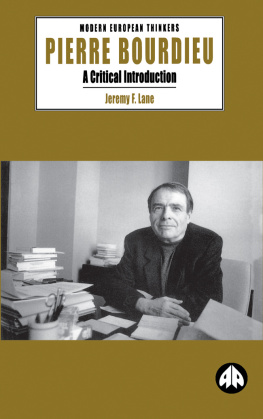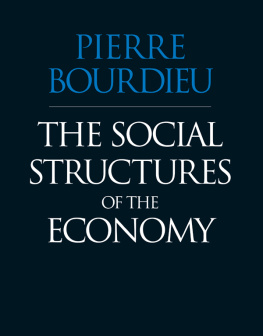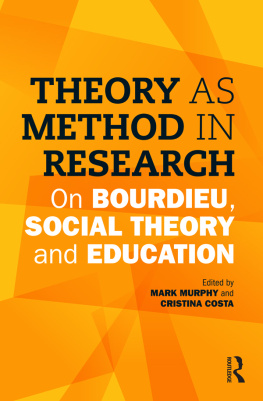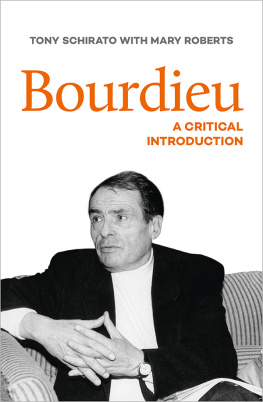
Pierre Bourdieu
Key Concepts
Key Concepts
Theodor Adorno: Key Concepts
Edited by Deborah Cook
Alain Badiou: Key Concepts
Edited by A. J. Bartlett and Justin Clemens
Pierre Bourdieu: Key Concepts
Edited by Michael Grenfell
Gilles Deleuze: Key Concepts
Edited by Charles J. Stivale
Michel Foucault: Key Concepts
Edited by Dianna Taylor
Jrgen Habermas: Key Concepts
Edited by Barbara Fultner
Martin Heidegger: Key Concepts
Edited by Bret W. Davis
Immanuel Kant: Key Concepts
Edited by Will Dudley and Kristina Engelhard
Merleau-Ponty: Key Concepts
Edited by Rosalyn Diprose and Jack Reynolds
Jacques Rancire: Key Concepts
Edited by Jean-Philippe Deranty
Wittgenstein: Key Concepts
Edited by Kelly Dean Jolley
Pierre Bourdieu
Key Concepts
SECOND EDITION
Edited by Michael Grenfell

First published in 2008 by Acumen.
Published 2014 by Routledge
2 Park Square, Milton Park, Abingdon, Oxon OX14 4RN 711
Third Avenue, New York, NY 10017, USA
Routledge is an imprint of the Taylor & Francis Group, an informa business
Editorial matter and selection 2008, 2012 Michael Grenfell.
Individual contributions, the contributors.
Second edition 2012.
This book is copyright under the Berne Convention.
No reproduction without permission.
All rights reserved. No part of this book may be reprinted or reproduced or utilised in any form or by any electronic, mechanical, or other means, now known or hereafter invented, including photocopying and recording, or in any information storage or retrieval system, without permission in writing from the publishers.
Notices
Practitioners and researchers must always rely on their own experience and knowledge in evaluating and using any information, methods, compounds, or experiments described herein. In using such information or methods they should be mindful of their own safety and the safety of others, including parties for whom they have a professional responsibility.
To the fullest extent of the law, neither the Publisher nor the authors, contributors, or editors, assume any liability for any injury and/or damage to persons or property as a matter of products liability, negligence or otherwise, or from any use or operation of any methods, products, instructions, or ideas contained in the material herein.
ISBN: 978-1-84465-529-8 (hardcover)
ISBN: 978-1-84465-530-4 (paperback)
British Library Cataloguing-in-Publication Data
A catalogue record for this book is available from the British Library.
Typeset in Sabon and Myriad by JS Typesetting Ltd,
Porthcawl, Mid Glamorgan
Contents
Michael Grenfell
Michael Grenfell
Derek Robbins
Karl Maton
Patricia Thomson
Nick Crossley
Rob Moore
Ccile Deer
Cheryl Hardy
Michael Grenfell
Steve Fuller
J. Daniel Schubert
Ccile Deer
Michael Grenfell
Cheryl Hardy
Michael Grenfell
Michael Grenfell
Nick Crossley, School of Social Sciences, University of Manchester, UK.
Ccile Deer, Balliol College, University of Oxford, UK.
Steve Fuller, Department of Sociology, University of Warwick, UK.
Michael Grenfell, Faculty of Arts, Humanities and Social Sciences, Trinity College, University of Dublin, Ireland.
Cheryl Hardy, Programme Director, British Institute of Technology.
Karl Maton, Department of Sociology and Social Policy, Faculty of Arts, University of Sydney, Australia.
Rob Moore, Homerton College, University of Cambridge, UK.
Derek Robbins, School of Law and Social Sciences, University of East London, UK.
J. Daniel Schubert, Department of Sociology, Dickinson University, USA.
Patricia Thomson, School of Education, University of Nottingham, UK.
I wish to acknowledge the help and support extended to me by Cheryl Hardy while I was working on the two editions of this book. She also read the original manuscript and provided valuable feedback on it, as well as contributing a new chapter for and discussing the format of the second edition.
I also appreciated the way that each of the contributors re-engaged with this project in reviewing and revising their individual chapters. Their enthusiasm for Bourdieu and this collected volume has been an inspiration to me.
I am grateful to Gayna Davey and Karl Maton for their comments on the first edition of this book, and various reviewers of it. Their combined views have helped me shape this new edition.
As always, I wish to extend thanks to my editor and publisher Tristan Palmer for his continued support, understanding and guidance.
The second edition of this book has afforded us the opportunity to review, revise and extend our coverage of the work of Pierre Bourdieu. Each chapter has been reconsidered by the contributing authors with a view to bringing the bibliography up to date, developing discussion and clarifying points from the first edition. However, we have also added an entire new part entitled Applications. Having completed the first edition of the book, I felt there was a need to include something about actually using these concepts in practice, which I then did in the form of a postscript on methodological principles. Here, I set out a framework for conducting research from a Bourdieusian perspective in terms of key elements to be adopted by the would-be researcher. This postscript has now been extended to an entire chapter, which is complemented by two other chapters on Social Space and Politics. The first of these develops methodological concerns when constructing and representing social contexts, and offers examples and guidance on how to think of space in these terms. The chapter on politics reminds us of the radical intent behind much of Bourdieus work, and considers the way these ideas may impact in the political arena and society at large.
A new edition also allows us to respond to our critics. On the whole, the book has been well received by reviewers, and it has been popular among researchers and students interested in working with Bourdieu. From the outset, I knew that to deal with each concept one by one was a hazardous project. In much of my own writing, I insisted that all of the concepts had to be viewed in an integrated form, not cut up and used discretely on their own. Nevertheless, I did feel there was something to be gained by taking each one by one and, in a way, looking at the others through that individual lens. Some reviewers have been keen to point out the dangers of such an enterprise. For one, even to talk about subjectivity and objectivity was tacitly to approve a dichotomy that would be divisive. Others have seen a more logical priority between field and habitus, or again insisted that you cannot talk about one without the other. Bourdieus epistemology always has required a kind of dialectical thinking, which necessitates keeping at least one thing in mind while considering another. I am, therefore, happy to stress again that in reading through the concepts one by one, the reader must develop a view of the overall picture how ultimately all of them are of one and the same epistemology. I also felt the need to create more of a narrative structure to the book, so introduced part headings and introductions. Again, these should be seen as facilitating digestion of the main concepts rather than implying any substantive theoretical intent. This new edition has allowed us to both sharpen and nuance these aspects of the book while preserving its principal format.
Next page










